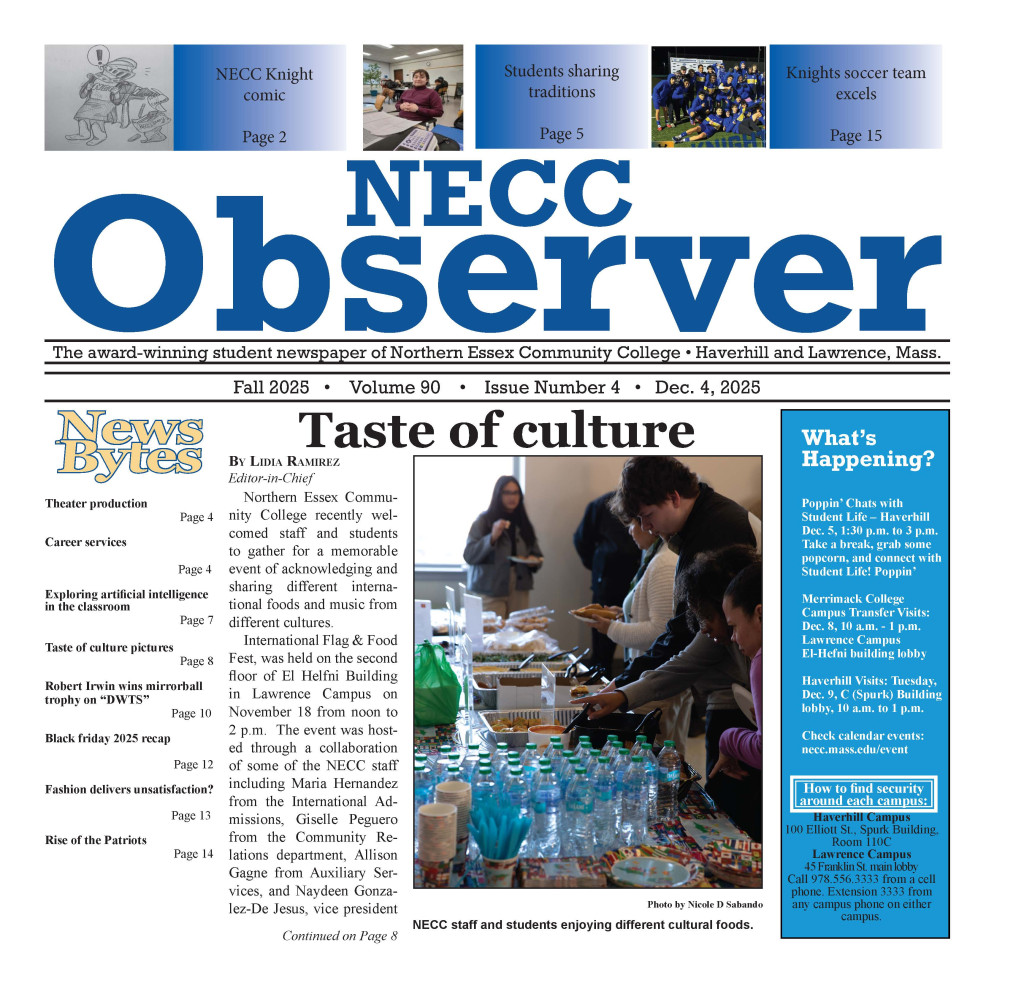
Hispanic Heritage Month sparks discussions
As Northern Essex Community College (NECC) celebrates Hispanic Heritage Month, students and staff reflect on how breaking generational cycles can empower future generations. With 47% of its student body identifying as Hispanic, NECC is fostering conversations about identity, tradition, and the pressures young Latino individuals face as they navigate evolving cultural values.
“Sin profecía el pueblo se desenfrena; Mas el que guarda la ley es bienaventurado,” reads Proverbs 29:18, a verse often quoted in Latino communities. It translates in English “Where there is no vision, the people perish: but he that keepeth the law, happy is he,” according to the King James version of the Bible. It speaks to the importance of vision and guidance as cultural landscapes change. For many, Hispanic Heritage Month is not only a celebration of the rich history of Latino communities but also an opportunity to engage in conversations about moving away from traditions that no longer serve younger generations.
Juana E. Zapata, of the Latinx Center for Empowerment in Lowell, emphasized the importance of addressing outdated traditions that no longer fit modern life. “Many of us grew up with traditions that no longer fit our lives today,” Zapata said. She pointed to the use of the “chancleta,” a tool for discipline in many Latino households, which she says is now being questioned by younger generations.
Zapata added that respect is still valued, but the methods of teaching it might need to evolve. “In our culture, respect is often expected, especially from children, without a lot of room for dialogue,” she said. “But today’s generation is pushing for a culture of understanding and openness.”
Yadalee Peña, a 17-year-old student from Greater Lowell Technical School, echoed this sentiment. Peña noted the challenge of balancing cultural pride with the desire for change. “Hispanic Heritage is important to me,” she said. “I love that it shows off my culture, but some traditions feel burdensome, especially when they impact mental and emotional well-being.”
Peña’s reflections illustrate the generational divide many young Latino individuals face. While they want to honor their heritage, they also question whether certain cultural practices, such as family rituals after a death, remain necessary.
Maria Hernandez, Director of International Student Support and Special Populations at NECC, emphasized the complexities surrounding Latino identity in a thought-provoking manner. “Who am I?” she asked, highlighting the challenge of defining what it means to be Latino or Latina in today’s world. “Are we even a race? How can we be categorized as one when we are so many things?”
Hernandez also discussed the origins of Hispanic Heritage Month, which was first established by President Lyndon Johnson in 1968 as a week-long celebration. It was expanded to a month in 1988 by President Ronald Reagan. The celebration coincides with the independence days of several Latin American countries, marking shared heritage, but Hernandez noted that Hispanic Heritage Month is also an opportunity to engage in difficult conversations about identity and tradition.
“How do we get more Latino students involved?” Hernandez said. “How do we create a movement that draws them in, makes them feel connected, and shows them the power of their collective voice?”
Both Hernandez and Zapata emphasized the role of organizations like the Latinx Center for Empowerment in creating a sense of community. The center, based in Lowell, offers services like translation, English classes, and access to immigration lawyers. “Our goal is to help our community grow while honoring where we come from,” Zapata said.
Reflecting on the future, Zapata believes that while change is necessary, the positive aspects of Latino culture should be preserved. “We must evolve, but we can still hold onto the values that bring us together our love for family, our strong sense of identity, and our history,” she said.
Hernandez agreed, noting that the key to progress lies in dialogue and education. “Hispanic Heritage Month reminds us to celebrate our culture, but also to challenge generational cycles that may no longer serve us,” she said. “These tough conversations can spark the kind of change that empowers future generations.”
Before the conversation ended, Hernandez offered a hopeful message: “Stay tuned.”
Her words serve as a reminder that these discussions are just the beginning, and that the path forward is full of possibility for deeper dialogue and greater unity.
As Hispanic Heritage Month draws to a close, it’s an ideal time for the NECC community and beyond to come together, reflect, and celebrate the richness of our culture. Let’s continue the conversations about our shared heritage, identity, and the beauty of our traditions.

